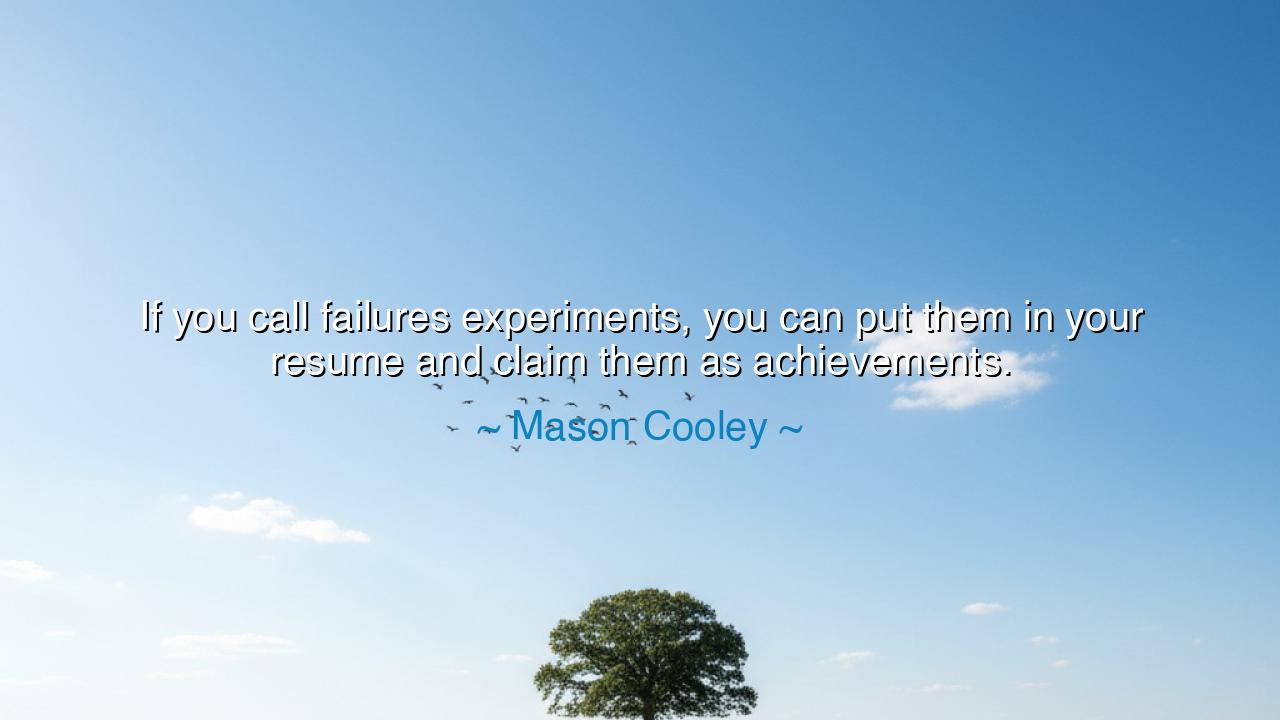
If you call failures experiments, you can put them in your
If you call failures experiments, you can put them in your resume and claim them as achievements.






O Seekers of Wisdom and Resilience, listen to the insightful words of Mason Cooley: "If you call failures experiments, you can put them in your resume and claim them as achievements." In this profound truth, Cooley speaks to the nature of failure—not as a mark of defeat, but as a powerful tool for growth and discovery. When we redefine our failures as experiments, we shift our perspective. Rather than viewing them as setbacks, we see them as stepping stones on the path of progress. This shift transforms the painful process of failure into a source of pride, for each experiment teaches us something valuable, refining us for the future.
Consider, O Children, that in the eyes of the wise, there is no true failure, only the opportunity to learn. Failures are but the echoes of past attempts, each one a lesson in perseverance, adaptability, and self-improvement. Experiments carry with them the possibility of success, but also the wisdom that comes from understanding what does not work. To see failure as an experiment allows us to discard shame and embrace the lesson that lies within. Every setback becomes a vital part of the journey, a way to strengthen the spirit and sharpen the mind.
Look to the example of Thomas Edison, whose countless failures in inventing the lightbulb are now seen as the experiments that led to success. Edison famously failed over a thousand times before achieving the breakthrough that brought light to the world. Had he seen these failures as mere missteps, he might have given up in despair. Instead, he viewed each failure as a necessary part of the process, a test to refine his methods. Edison’s experiments are now celebrated as monumental achievements in the history of human progress. His failures, framed as experiments, became the foundation of his legacy.
And so, O Seekers, let us understand that failure is not the end, but the beginning of growth. When we reframe our mistakes as experiments, we free ourselves from the burden of regret and transform our past challenges into victories. The true strength lies not in avoiding failure, but in having the courage to learn from it, to rise each time we fall, and to claim our experiments as achievements. In this way, we cultivate a life of resilience, where every setback becomes a stepping stone to greater wisdom and strength.
Let us, therefore, embrace the mindset of the experimenter, where every failure is an opportunity, every mistake a lesson, and every setback a building block of our eventual success. Cooley’s words teach us that our failures are not marks of disgrace, but triumphs of the spirit. With each experiment we undertake, we build the resume of our lives, one that reflects not the absence of failure, but the wisdom gained from it. In this, we find the true meaning of achievement—the courage to continue, the wisdom to adapt, and the strength to rise again.






PNDuong Dang Phuong Nam
There’s a privilege question here. Some people get applauded for “bold experiments,” others get penalized for the same outcomes. Who can safely reframe setbacks, and who gets labeled reckless? What structures make it fairer—standardized postmortem templates, blameless reviews, and interview rubrics that test for learning agility rather than flawless wins? I’d like a concrete exercise: give candidates a failed initiative case and ask for a learning plan, next steps, and risk controls. Would that shift the culture from optics to growth?
GDGold D.dragon
Product perspective: not every A/B test moves the needle, and that’s OK if it narrows uncertainty. I’d love a résumé format that foregrounds decision value: problem framing, hypothesis, minimal viable test, measured effect (including null results with confidence intervals), and the specific playbook change that followed. Could you suggest two or three examples? For instance, a redesign that didn’t lift conversion but revealed a latency choke point, leading to a performance sprint and lower bounce. How do we quantify that learning without sounding evasive?
Ppii
Personally, this touches my tendency to rationalize. Reframing can be liberating—less shame, more curiosity—but it can also dull accountability. What practices keep the ego honest? I’m experimenting with a weekly “postmortem lite”: write the assumption I held, the evidence I had, the move I made, the outcome, and one behavior I will do differently next time. Does that sound rigorous enough? Any prompts for distinguishing growth-oriented reflection from convenient gloss, especially when talking to future employers or collaborators?
Ttrang
From a research mindset, I’d want guardrails before embracing this framing. Did you specify a hypothesis, success criteria, and stopping rules in advance? Were results shared even when inconvenient? If sample sizes were tiny or confounders rampant, can you still claim growth with intellectual honesty? I’d value a brief methodology appendix in a portfolio: what you planned, what you measured, what surprised you, how your priors shifted. Without transparent design and calibration checks, “learning” risks becoming survivorship bias dressed up as wisdom.
CLTruong Thi Cam Loan
Speaking as a hiring manager, I don’t mind candidates who have scars; I mind candidates who narrate every scar as secret victory. What artifacts demonstrate genuine learning—decision logs, pre-mortems, KPI dashboards, or postmortems with counterfactuals? When you say an initiative taught you something, can you point to a subsequent decision where the lesson changed your behavior and moved a metric? I’m OK with experiments that fail. I’m not OK with euphemisms. How can interviews reliably separate reflection from retroactive storytelling?